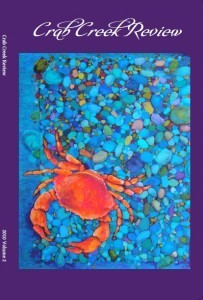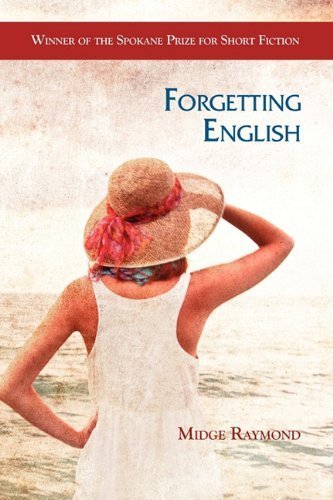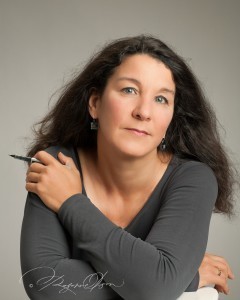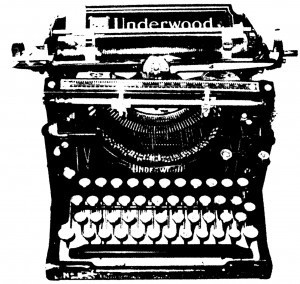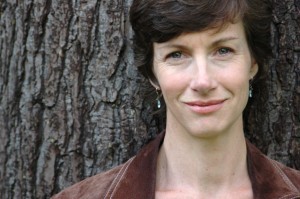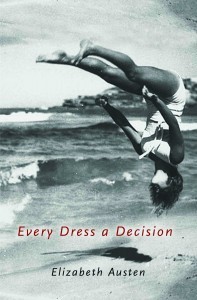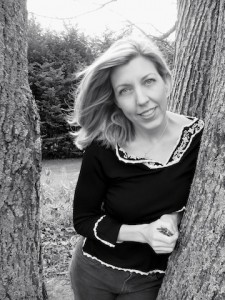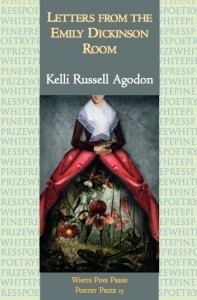Midge Raymond's Blog, page 49
April 12, 2011
Virtual Book Tour: Crab Creek Review
I'm thrilled today to be blogging at Seattle's Crab Creek Review, one of my favorite literary magazines, about putting time and space between yourself and a piece of writing (it's true: absence really does make the heart grow fonder).
Join me at the Crab Creek Review blog — and be sure to check out the magazine and all the latest news here. Thanks so much to editors Kelli Russell Agodon and Annette Spaulding-Convy for hosting me!

April 11, 2011
Weekly Writing: Quickies
A great many writers have to work their writing in around day jobs, childcare, housework, yard work, volunteering, and other aspects of Life … today, for example, I am fitting this blog post in even though it is Book Launch Day for the new edition of Forgetting English . There is no rest for the weary, self-promoting writer — but we still must find that writing time, yes?
. There is no rest for the weary, self-promoting writer — but we still must find that writing time, yes?
So today I'd like to honor this notion with a few quick writing exercises that can be done in five minutes or fewer. Whether you're waiting for your morning coffee to brew or for your train to arrive, this is time you could be writing — so why not use it?
- Write about what you're wearing on your feet (if anything). Use as many details as time allows.
- Describe your last bad haircut.
- Write about a time you were late.
- Describe what you looked like at the age of five.
- Write about getting caught in the rain.

April 7, 2011
Book Promo 101: The virtual book tour
My book will be reissued next week — on April 11, to be exact! — yet my official "book tour" doesn't start until this summer, stretching into the fall. Q: So what can an author do when scheduling doesn't allow travel between the book launch and the book tour? A: She can set up a Virtual Book Tour.
What is a Virtual Book Tour? It's simply another way to get out there and do what you do — talk about your book, connect with readers, answer questions — only this way, you're doing it all virtually instead of live and in person. The nice thing about this is that, unlike with a live book tour, on a virtual tour you can wear yoga pants the whole time (unless, of course, you go onto Skype or do any video chats).
For example, here are a few things I'll be doing on my Virtual Book Tour:
- I'll be a guest blogger on several writer/reader blogs (check back next week for directions!)
- I'll be doing interviews and/or Q&As on reader/writer blogs
- I'm doing several giveaways (among them, this one on Goodreads)
- I hope to do a few taped readings, interviews, and/or podcasts, much like the ones I did for the first edition of Forgetting English (Writers Out Loud and Blog Talk Radio among them)
The nice thing about the virtual tour is that the possibilities are seemingly endless: You can go anywhere. The fact that you can do this also makes it a bit overwhelming. Over the last few weeks that I've been planning this tour, I've come up with a few tips to share with you…
- Just because you can do everything doesn't mean you must do everything. At least not all at once. Launching a book into the world is a big deal, and it's tempting to want to do every single thing you can. However, you'll probably go a little insane if you try this. I suggest a schedule that includes daily events the first week, then tapering it down a bit to 2-3 events per week over the following weeks. This will give you good buzz in the beginning, then allow you to breathe again.
- Start developing relationships early. You don't want to be rushing to get events lined up at the last minute, and you also don't want to be demanding of your fellow bloggers. Ideally, you'll have a good writers' network in place — if not, start networking well before your pub date. And, most important of all, ask not only what your fellow writers can do for you but what you can do for them: Offer them guest spots on your own blog; ask them how you can help them out, too.
- Have FUN! Don't make book promotion a chore, or you'll grow to hate it. Doing so much writing and talking in a short period of time can get exhausting, so you'll have to find your own balance to avoid burning out. And while many people will tell you that you have to base all your events around the book launch date, I'm more of the mindset that "every week is book-launch week," in that, for one, book promotion never really ends; and two, it's not the end of the world if you don't fit it all into one week, or even one month. Rather attempt to cram everything into a short period of time, you'll be better off in the long run if you think about ways to promote your book all year, and all the time.
I look forward to seeing you (virtually) next week! Join me on Facebook and Twitter to stay in touch.

April 6, 2011
Win a copy of Forgetting English!
Goodreads Book Giveaway
Forgetting English
by Midge Raymond
Giveaway ends April 15, 2011.
See the giveaway details
at Goodreads.

April 4, 2011
Weekly Writing: Guest prompt by Susan Rich
Happy April, writers!
In honor of National Poetry Month, I'm happy to offer this week's writing prompt by Seattle poet Susan Rich. Susan is the author of three books of poetry: The Cartographer's Tongue , Cures Include Travel
, Cures Include Travel , and, most recently, The Alchemist's Kitchen
, and, most recently, The Alchemist's Kitchen . She has received awards from PEN USA, The Times Literary Supplement, and Peace Corps Writers. Her fellowships include an Artist Trust Fellowship from Washington State and a Fulbright Fellowship in South Africa. Her poems have appeared in numerous journals and anthologies, among them the Antioch Review, Alaska Quarterly Review, Christian Science Monitor, Harvard Review, Gettysburg Review, New England Review, Northwest Review, Poetry International and The Southern Review. Susan teaches at Highline Community College, where she runs the reading series Highline Listens: Writers Read Their Work. Be sure to visit Susan's blog this month — for National Poetry Month, she'll be posting a Poetry Giveaway on her blog that will include a copy of The Alchemist's Kitchen! And do check out her web site as well.
. She has received awards from PEN USA, The Times Literary Supplement, and Peace Corps Writers. Her fellowships include an Artist Trust Fellowship from Washington State and a Fulbright Fellowship in South Africa. Her poems have appeared in numerous journals and anthologies, among them the Antioch Review, Alaska Quarterly Review, Christian Science Monitor, Harvard Review, Gettysburg Review, New England Review, Northwest Review, Poetry International and The Southern Review. Susan teaches at Highline Community College, where she runs the reading series Highline Listens: Writers Read Their Work. Be sure to visit Susan's blog this month — for National Poetry Month, she'll be posting a Poetry Giveaway on her blog that will include a copy of The Alchemist's Kitchen! And do check out her web site as well.
I love that Susan has chosen an exercise on interviewing — one of a writer's greatest skills, right along with listening. Susan's exercise is inspired in part by her interviews with new Somali citizens for the Somali Voices project (these poems appear in her second book, Cures Include Travel).
Enjoy — and don't miss Susan's lovely poem "Interview," which appears after the exercise.
Applying Creative Research
Recently I've discovered a new love: interviewing. I think the type of deep listening required in the role of interviewer is something many writers – many people crave. StoryCorps is an independent non-profit which has made interviewing a part of the national conversation examining what makes us human.
In my work as a poet, a human rights worker and now as a teacher, asking good questions is key to understanding the woman (or man) who sits right in front of me. I love the feeling when the interviewee makes a discovery about their life prompted by my question. In some cases, I can see the flicker of awareness literally alter my guest's expression. Isn't this what we, as writers, want our work to do? Don't we want to prompt our readers, our listeners into understanding their lives anew?
So here's your mission should you choose to accept it: Begin by interviewing someone you know. Or someone you would like to know. Draw up a varied set of interview questions. I'm often surprised by which question prompts the best response. Once the conversation is moving, feel free to follow it wherever it goes. I'd suggest taping the interview (with permission) as well as jotting down notes. After you listen to the tape and look over your notes, write out the passages that resonate. Your final piece will be a mix of words directly from the interview as well as words of your own.
In my work, I often use phrases from the original interview, but then pour the words into a different form – a villanelle, a sonnet, or a two-lined call and response in order to take the interview somewhere new. The end goal is not to be a journalist but instead use the interview as a jumping off point for a poem or a story. Here's a villanelle I wrote based on an interview with a young woman from Bosnia and Herzegovina. Just out of high school, "Lara" had been an ambulance dispatcher at the beginning of the Bosnian war. The facts in the poem are all true – the words are a mix of Lara's and mine. Fans of the villanelle will notice I broke the form to leave the story unfinished – the final line of the form has been removed.
Interview
~ for Lara
In her mind, she needs to cross the boundary
navigate clear water, sleep again, be whole ~
she'll erase her Muslim name, forget life's memory.
Why not Bavaria? Why not the travel remedy?
Study without the Sarajevo Rose.*
Her mind a boat; she floats across the boundary.
Everyone said, the conflict? only temporary ~
She'll call her family often; keep close by telephone;
pour the past away, skip the shit of memory.
But each night she pays, this is not her country.
The thoughts shoot back and forth, a mental palindrome.
Her mind: ocean without boundary.
Other students stare in disbelief as she leaves, quietly~
a homing instinct, streams; she charts the map alone.
Is the past no more than present memory?
For one moment, her return is almost celebratory.
Mortar rounds and shelling, a kind of pleasure dome.
Her mind circles round blue boundaries.
* The Sarajevo Rose is the pattern made by a mortar shell exploding; specifically, it is the imprint left on the tarmac.
Published originally in Harvard Review and republished in The Alchemist's Kitchen, White Pine Press, 2010.
Photo of the author by Rosanne Olson.

March 28, 2011
Weekly Writing: Other people's treasures
I recently went through a box of stuff that I've now moved (unopened) through three states and into three different homes. Finally, it occurred to me that I should open it up before another five years go by and I put it into another moving truck without even knowing what's in there.
So I opened it, and I discovered that it's not even my stuff.
The box was filled with old letters, magazines, and photos that I'd found while cleaning out the garage of my parents' house — but it didn't belong to them, either. All these things belonged, apparently, to someone who'd lived there years before: letters from Hollywood executives, a signed original photo of Jimmy Stewart, even a Social Security card. There's something about these forgotten items that won't let me throw them away, even though they have nothing to do with me. It intrigues me that there's a whole history here on the floor of my office, an entire life, albeit in very small pieces. (And I have a feeling that the next time I move, it will all go with me yet again.)
So, with other people's treasures in mind, here's today's writing prompt:
Write about something you found, using lots of details. Next, imagine its history: who owned it; why he/she left it behind or how it got lost; what you did with it or are planning to do with it; why you kept it, or why you didn't.

March 20, 2011
Weekly Writing: Guest prompt by poet Elizabeth Austen
I'm thrilled this week to present a guest prompt by the amazing Elizabeth Austen. Elizabeth's poetry is always a joy to read — and even better is to hear her perform her work live (if you're in the Pacific Northwest, scroll down for Elizabeth's upcoming events). I love the way she inspires us to pay attention to language, whether we're reading or listening, and I always find myself reading each of Elizabeth's poems many times over to capture the depth of the worlds that each of them contains.
A poet, performer, and teacher, Elizabeth is the author of the poetry collection Every Dress a Decision, forthcoming from Blue Begonia Press next month, and the chapbooks The Girl Who Goes Alone (Floating Bridge Press, 2010) and Where Currents Meet (part of the 2010 Toadlily Press quartet Sightline). She is a dynamic performer of her own and others' poems and frequently teaches the art of poetry aloud. For more than 10 years, she has produced literary programming for KUOW, 94.9, one of Seattle's NPR affiliates, introducing recordings of Pacific Northwest literary events and interviewing local and national poets, and she has received grants from Artist Trust, 4Culture, and the City of Seattle.
This prompt is perfect for all writers — enjoy!
Cultivating Opposites
One of my favorite starting places for poems involves working with opposites – or, as the poet Marie Howe put it in a recent workshop, "contraries." Whatever our background, we all have stories that we've carried around so long we can't even remember a time before we knew them. These may be stories about our own family or romantic history, stories handed down by our church or religion, etc. Telling these stories in the usual way can lead us into predictable territory – "I have my point of view, and I'm sticking to it" – and into clichés of thought or feeling. But what about entertaining the opposite point of view, or taking a contrary position to the one we've always held (or always been told)?
So, here's your starting point: pick a familiar story. Now, pivot your frame of reference 180 degrees, and re-tell that story from another – an opposite, a contrary – point of view. This works equally well for any genre. (And on a side note, this can be a very potent tool for revision. Take a poem or story that just isn't working, and either write the whole thing from a completely opposing point of view – reversing all the details – or inject a contrary voice. See where that takes you – at the very least, it's sure to give your draft new energy.)
Here's a poem from my collection Every Dress a Decision that takes a contrarian view of story from Genesis:
It Didn't Happen That Way
Unless the apple itself, longing
to be known, can be blamed
for the light bent
across its skin
for the mid-day heat
transforming sugar to scent.
And him? She didn't say
a word to him. He found
her, slack-jawed
skin flushed and damp
as if he had lain on her
pressed into her—
he found her, swallow by swallow
savoring the taste of knowledge
her eyes fixed, focused
somewhere beyond him
as if he no longer existed.
And one more thing—
she didn't tempt him. In fact
she never offered it.
He pried the fruit
from her hand, desperate
to follow, and bit.
If you're in the Pacific Northwest, be sure to mark your calendar to attend at least one of Elizabeth's readings:
- Saturday, April 2, at the Silverton Poetry Festival
- Sunday, April 10, at 7 p..m at the Doe Bay Cafe on Orcas Island (part of the SPLAB series)
- Thursday, April 28, at 7 p.m. at Cheap Wine and Poetry at Richard Hugo House
- Friday, April 29, 7 p.m. at Bellingham's Village Books

March 14, 2011
Weekly Writing: Not-so-strangers
There's a woman who walks in my neighborhood about whom I'm becoming increasingly curious: I see her often, around the same time of day; she's always wearing the exact same coat, hat, and scarf; and she doesn't make eye contact, as if she is lost in another world.
For me, this is one of the ways a story begins: curiosity about someone who seems mysterious (and may not be, but it's what we don't know that always intrigues us the most). So, in the spirit of creating mystery, here's this week's writing assignment:
Choose someone you see semi-regularly (your barista, the checkout clerk at the supermarket, the jogger you pass on the trail, etc.), and write two pages about this person. Begin your writing with something you imagine this person doing the day before you saw him/her.

March 7, 2011
Weekly Writing: Mug shots
I recently discovered this archive of Australian mug shots from the early twentieth century (via Very Short List) and found them quite riveting: These aren't your standard boring mug shots but rather works of art. Many of them are full-body poses, and in them the alleged criminals are wearing their hats and coats, their jewelry and furs. They're men and women, young and old, some looking despondent and some outright jolly. In one photo, a woman poses with her eyes closed, looking almost serene; in another, a man's scarred face faces directly into the camera. And nearly all of them have very interesting hair.
So here's this week's writing exercise:
Choose one of these mug shots, and write a story, essay, or poem about the person you see in the photo.

February 28, 2011
Weekly Writing: Guest prompt by poet Kelli Russell Agodon
This week, I'm delighted to present a writing exercise by poet Kelli Russell Agodon, whose amazing collection of work finds beauty in all sorts of unimaginable places — and I find her writing prompts so wonderful because she inspires us to do exactly the same. And you'll also be able to enjoy Kelli's lovely poem "Self Portrait With Optic Neuritis," below, which was inspired by this exercise.
Kelli is the acclaimed author of the recently published Letters From the Emily Dickinson Room , winner of the White Pine Press Poetry Prize judged by Pulitzer Prize winner Carl Dennis. She is also the author of Small Knots
, winner of the White Pine Press Poetry Prize judged by Pulitzer Prize winner Carl Dennis. She is also the author of Small Knots and the chapbook Geography. Kelli lives in Washington state, where she is an avid mountain biker and a lover of chocolate, handwritten letters, and art. Kelli co-edits Seattle's wonderful 28-year-old print literary journal Crab Creek Review, and she blogs about living and writing creatively at her inspiring blog, Book of Kells. Visit her online at www.agodon.com.
and the chapbook Geography. Kelli lives in Washington state, where she is an avid mountain biker and a lover of chocolate, handwritten letters, and art. Kelli co-edits Seattle's wonderful 28-year-old print literary journal Crab Creek Review, and she blogs about living and writing creatively at her inspiring blog, Book of Kells. Visit her online at www.agodon.com.
This prompt is for poets as well as writers of all genres — enjoy!
We have all seen self-portraits by visual artists—Frida Kahlo's "Self Portrait with Cropped Hair," "Self Portrait with Necklace," or "Self Portrait with Monkey"—and what interests me in these works is what the artist chooses to highlight in these paintings.
For this writing exercise, you'll begin with a title:
Self Portrait With ______________ (fill in the blank)
You are welcome to fill in the blank with any current obsession or interesting word/words you like. Try to choose a word that excites you as in this exercise, as you will return to that word many times. Your title can be anything from Self Portrait with Machete to Self Portrait with Mother Teresa. You can use a few words to stretch your subject into something more such as Self Portrait with Broken Coffee Mug or Self Portrait with Winning Lottery Ticket. It is completely up to you.
You are welcome to write a short story, creative non-fiction piece or in the form of a poem. Or for an extra challenge, use the same title for two different genres and see what happens.
_____________
Self Portrait With Optic Neuritis
by Kelli Russell Agodon
The ophthalmologist is looking through me.
On the other side of my eye
is God or a peach and I can't imagine
laughing again or seeing the purple
birthmark on my daughter's arm.
When he speaks, I hear shadows.
I hear the empty mouths
of bells. I begin to make promises
to remember long words,
to visit Taos before it is a cloudy city.
On the other side of vision, I can't imagine
the braiding of nerves inside me,
the light reflecting off an unpainted wall
or the red matter, the rug from India
hanging across the window.
The eye chart hides beneath a haze.
They flip through a book and I am to see
numbers, what I say is: I don't know,
I don't know. His assistant leads me
into the waiting room. I hear a man talking
to his child—she must be only two,
her footsteps sound like dancing.
I hear him tell her to follow him,
then say, I think you'll need to hold my hand.
previously published in In Posse


